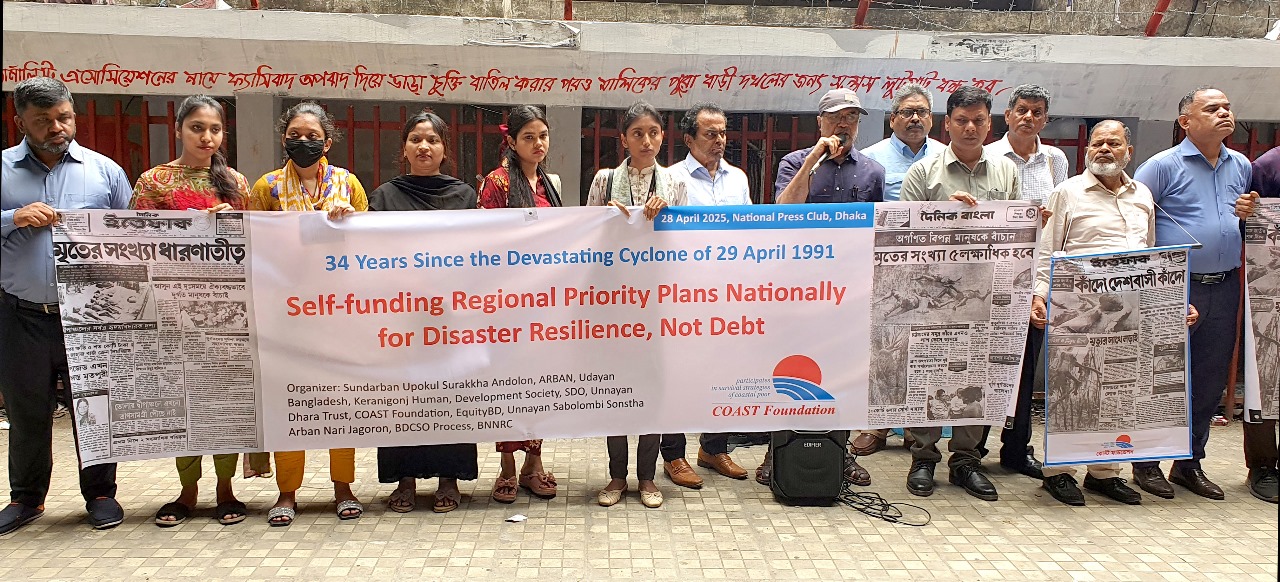Mustafa Kamal Akanda
Published:2025-04-28 16:26:26 BdST
Human chain in remembrance of the devastating cyclone Mary-An of April 29, 1991CSOs call for self-funded plans for disaster resilience, no to debt creating instrument
There is an urgent need to adopt self-funding regional priority plans nationally for disaster resilience, instead of relying on debt.
UN agencies and INGOs must refrain from direct project implementation and provide space for local NGOs to lead.
Investment should be increased in sustainable waste management and in establishing climate-resilient saline-free water treatment plants to mitigate the freshwater crisis.
Sustainable concrete embankments should be constructed to protect the lives, assets and agricultural land of coastal communities.
In respect of construction Water Development Board should be accountable to local government.
Today, civil society speakers expressed these demands at a human chain held in front of the National Press Club on Topkhana Road in Dhaka to commemorate those lost in the devastating cyclone "Mary-An" that struck the coastal areas on April 29, 1991.
The Sundarban Upakul Surokkha Andolon, ARBAN, Udayan Bangladesh, Keraniganj Human Development Society, SDO, Unnayan Dhara Trust, COAST Foundation, Equity BD, Unnayan Sabolombi Sangstha, ARBAN Nari Jagoron, BDCSO Process, and BNNRC jointly organized this event with the leadership of EquityBD.
Mustafa Kamal Akanda of EquityBD moderated the event. The event was chaired by Rezaul Karim Chowdhury, Executive Director of COAST Foundation.
The speakers included Mr. Nikhil Chandra Bhadra, Coordinator of Sundarban Upakul Surokkha Andolon, Mr. Sheikh Asad, Executive Director of Udayan Bangladesh, Shaheda Khatun of Youth Action for Development, Mr. Sahriar Shaon of Water Keepers Bangladesh, M.A. Hasan of COAST, among others.
Shaheda Khatun stated that if we do not implement sustainable waste management initiatives now, leaving a habitable world for future generations will not be feasible.
She called on the government and major financial institutions such as PKSF and MRA to invest in sustainable waste management initiatives, including expanding fecal sludge treatment plants and plastic recycling facilities to protect the environment.
Shahriar Shawon said, Mangrove forests protect us in any disaster. But power plant projects like Rampal-Matarbari are being built by destroying these forests. We want to demand that we move away from these environmentally destructive projects and move towards renewable energy.
M.A. Hassan remarked that the Ministry of Disaster Management and Relief has adopted a national strategy and a 20-year action plan [2022-2042] on internal displacement management. Six years have passed, and the government's initiative to implement this action plan is unclear.
He emphasized that merely formulating an action plan is insufficient to address the pressing crisis of future displacement; priority-based investments are essential to build a climate-resilient Bangladesh.
Mr. Sheikh Asad, noted that salinity intrusion and declining groundwater levels have resulted in an acute freshwater crisis, increasing health risks.
He demanded take immediate steps by govt to establish climate-resilient salinity-free water treatment plants to address this urgent drinking water issue.
Mr. Nikhil Chandra Bhadra stated that even though 34 years have passed since the cyclone, sustainable coastal protection issues remain as neglected as ever, coastal residents in ongoing fear and anxiety due to disaster alerts.
Mustafa Kamal Akanda emphasized that UN agencies and INGOs must avoid direct project implementation and allow local NGOs to take the lead.
He conveyed that the time has come to foster a sense of self-respect and self-development by establishing equitable and dignified partnerships between INGOs & domestic NGOs.
Rezaul Karim Chowdhury asserted the need for self-funding regional priority plans nationally for disaster resilience which should not be a debt creating instrument.
He stated that concrete embankments should be constructed to protect the lives, assets, and agricultural lands of coastal communities. The Water Development Board must be accountable to local government institutions.
He also mentioned that a maximum of Tk 2,000 crore will be necessary for concreate block embankment and generating coastal forests and the government should allocate this budget accordingly. The government should promote water treatment technology for sustainable solutions to the coastal freshwater crisis.
Unauthorized use or reproduction of The Finance Today content for commercial purposes is strictly prohibited.


